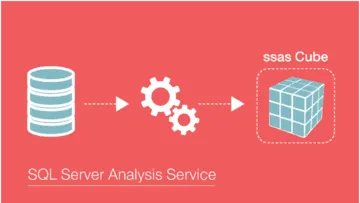
Introduction to SQL Server Analysis Services 
Discover the fundamentals of Introduction to SQL Server Analysis Services ▼
ADVERTISEMENT
Course Feature
![]() Cost:
Cost:
Free Trial
![]() Provider:
Provider:
QuickStart
![]() Certificate:
Certificate:
No Information
![]() Language:
Language:
English
![]() Start Date:
Start Date:
Self Paced
Course Overview
❗The content presented here is sourced directly from QuickStart platform. For comprehensive course details, including enrollment information, simply click on the 'Go to class' link on our website.
Updated in [May 19th, 2023]
This course, Introduction to SQL Server Analysis Services (ITADM0116008), provides an overview of the Microsoft Business Intelligence stack and how to develop Online Analytical Processing (OLAP) solutions. It covers the installation process and creating a project. The initial few lessons of Module 1 are included in this course.
[Applications]
The application of this course can be seen in the development of OLAP solutions. After completing this course, students can use the knowledge gained to create OLAP cubes, design and develop data models, and create reports and dashboards. They can also use the knowledge to develop and deploy SSAS solutions in an enterprise environment. Additionally, they can use the knowledge to troubleshoot and optimize SSAS solutions.
[Career Paths]
1. Business Intelligence Analyst: Business Intelligence Analysts are responsible for designing, developing, and implementing data analysis solutions to help organizations make better decisions. They use a variety of tools and techniques to analyze data, such as SQL Server Analysis Services, to create reports and dashboards. The demand for Business Intelligence Analysts is increasing as organizations become more data-driven and need to make better decisions.
2. Data Scientist: Data Scientists use a variety of tools and techniques to analyze data and develop predictive models. They use SQL Server Analysis Services to create data models and analyze data to uncover insights and trends. Data Scientists are in high demand as organizations look to leverage data to make better decisions.
3. Database Administrator: Database Administrators are responsible for managing and maintaining databases. They use SQL Server Analysis Services to create and maintain databases, as well as to optimize performance and ensure data integrity. Database Administrators are in high demand as organizations look to leverage data to make better decisions.
4. Data Engineer: Data Engineers are responsible for designing, developing, and maintaining data pipelines. They use SQL Server Analysis Services to create data pipelines and ETL processes to move data from one system to another. Data Engineers are in high demand as organizations look to leverage data to make better decisions.
[Education Paths]
1. Bachelor of Science in Computer Science: This degree program provides students with a comprehensive understanding of computer science, including topics such as programming, software engineering, computer networks, and database systems. Students will learn the fundamentals of computer science and develop the skills necessary to design, develop, and maintain computer systems. This degree is ideal for those interested in pursuing a career in software development, database administration, or network engineering.
2. Master of Science in Business Intelligence: This degree program provides students with a comprehensive understanding of business intelligence, including topics such as data mining, data warehousing, and analytics. Students will learn the fundamentals of business intelligence and develop the skills necessary to design, develop, and maintain business intelligence solutions. This degree is ideal for those interested in pursuing a career in data analysis, data science, or business intelligence.
3. Master of Science in Data Science: This degree program provides students with a comprehensive understanding of data science, including topics such as machine learning, artificial intelligence, and data visualization. Students will learn the fundamentals of data science and develop the skills necessary to design, develop, and maintain data science solutions. This degree is ideal for those interested in pursuing a career in data analysis, data engineering, or data science.
4. Master of Science in Artificial Intelligence: This degree program provides students with a comprehensive understanding of artificial intelligence, including topics such as natural language processing, computer vision, and robotics. Students will learn the fundamentals of artificial intelligence and develop the skills necessary to design, develop, and maintain AI solutions. This degree is ideal for those interested in pursuing a career in machine learning, deep learning, or artificial intelligence.
The development trends for these degree paths are rapidly changing as technology advances. As the demand for data-driven solutions increases, so does the need for professionals with the skills to develop and maintain these solutions. As such, these degree paths are becoming increasingly popular and are expected to continue to grow in the coming years.
Course Provider

Provider QuickStart's Stats at AZClass
Discussion and Reviews
0.0 (Based on 0 reviews)
Explore Similar Online Courses

Financial Analysis of Scenarios and Decisions

UX Data Analysis

RDBMS PostgreSQL

Intro To PostgreSQL Databases With PgAdmin For Beginners

PostgreSQL: Client Applications

Mastering SQL using Postgresql

Database Design and Basic SQL in PostgreSQL

PostgreSQL: Advanced Queries

Spatial SQL with Postgres : A language for geographers

Learn SQL Using PostgreSQL: From Zero to Hero

PostgreSQL Essential Training

Big Data Analysis with Scala and Spark
 Related Categories
Related Categories
 Popular Providers
Popular Providers
Quiz
 Submitted Sucessfully
Submitted Sucessfully
1. What is the full length course about?
2. What is the course code for Introduction to SQL Server Analysis Services?
3. What is the Module 1 about?
4. What is OLAP?
Correct Answer: Online Analytical Processing.


Start your review of Introduction to SQL Server Analysis Services